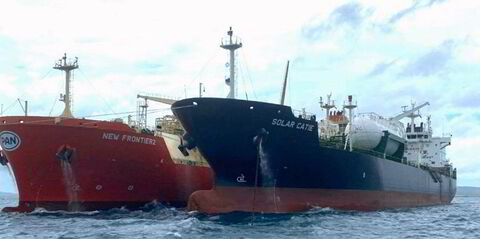New global banking rules will reshape maritime finance, tightening access to traditional debt financing, one leading lawyer believes.
Dora Mace-Kokota, head of the maritime, trade & offshore practice group at Stephenson Harwood, told TradeWinds that Basel IV regulations will particularly affect European lenders and smaller shipowners.
Since 1974, the Basel Committee on Banking Supervision has been the global authority on financial stability, setting the rules for how banks should manage their risks.
The latest framework, Basel IV, has been implemented incrementally from January 2023.
Mace-Kokota said Basel IV aims to restore credibility in the calculation of risk-weighted assets and increases capital requirements.
“The impact on European and Nordic banks, which often use internal models and have concentrated exposures in lower-risk areas, is expected to be more severe,” she said.
These banks will need to revise their capital calculation methodologies, as the cost of doing these deals could increase, according to Mace-Kokota.
They are also likely to impose stricter criteria when evaluating credit risk, focusing on factors such as vessel residual value, owner reputation, chartering arrangements and management quality.
“On the other hand, such institutions have been preparing for the transition in this space for some time and, accordingly, they may have already adjusted their models as well as their business approach,” she said.
“This could mean that any further adjustments that may be required will not swing the pendulum.”
Smaller shipowners could also face challenges, having traditionally relied on bank debt, she believes.
Under pressure
They are already under pressure to meet decarbonisation targets, requiring investment in sustainable fuels and energy-efficient technologies.
“Around 15,000 vessels are expected to reach the end of their economic life in the next decade, so the need for new financing is urgent,” she added.
But she acknowledged that the reduced availability of traditional bank finance is nothing new for the shipping market.
The financial crisis in 2008 and Basel III had already prompted a shift towards alternative financing sources.
“Basel IV is likely to accelerate this trend, so expect Asian banks, Chinese leasing companies, credit platforms, private equity and other types of capital stepping in to fill the gap,” she said.
This presents new opportunities for shipowners.
Mace-Kokota said syndicated loans from Asian banks, for example, could offer lower margins, especially for companies that can stabilise their revenue with long-term charters.
Credit platforms, private equity and institutional capital are also set to play a more prominent role, leading to more complex financing structures that spread credit exposure.
Sale-and-leaseback deals are expected to become more widespread as well, the lawyer argues.
“Basel IV presents a new challenge for the shipping industry, but also an opportunity for innovation. Both shipowners and financiers will need to adapt and find creative solutions to navigate the changing landscape,” she advised.
“The shipping industry has proven itself time and time again to be resilient.
“If shipowners embrace alternative financing sources and innovative solutions, [they] can continue to thrive in this new era of maritime finance.”







